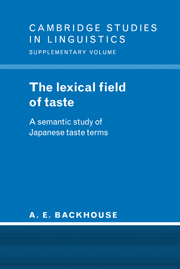Book contents
4 - Evaluative taste terms in Japanese
Published online by Cambridge University Press: 06 January 2010
Summary
In this chapter we treat the three lexical items OISHII ‘good-tasting’, UMAI ‘good-tasting’ and MAZUI ‘bad-tasting’, which together constitute a set of purely evaluative taste terms in Japanese. In 4.1 we discuss the delimitation of these terms. Their grammatical characteristics are surveyed in 4.2, and their syntagmatic and paradigmatic meaning relations are described in 4.3 and 4.4, respectively. These items are characterized by stylistic differentiation of a particularly complex kind, and the factors involved are examined in 4.5. 4.6 addresses the question of their extralingual meaning, and extended meanings of the terms are considered in 4.7.
Delimitation
The terms OISHII, UMAI and MAZUI regularly occur in responses to the question-frame X wa oishii/umai? (X/isolator/GOOD-TASTING, non-past) ‘Is/ are X good-tasting?’. The use of such a frame is a typical method of asking for evaluative judgements of the palatability of food substances: X in the frame is occupied by nouns denoting food substances or, alternatively, eating-places.
The following are typical examples of questions and responses:
Kono momo wa umai? Ee, suimi ga atte oishii.
THIS/PEACH/isolator/GOOD-TASTING, non-past/YES/TARTNESS/subject/BE PRESENT, conjunctive/GOOD-TASTING, non-past
‘Are these peaches good?’ ‘Yes, they have a tartness and taste good.’
Asuko no tempura wa umai? Iyaa, ammari oishiku nai.
PLACE/genitive/TEMPUR A/isolator/GOOD-TASTING, non-past/ NO/(NOT) VERY/GOOD-TASTING/negative, non-past
‘Is the tempura there good?’ ‘No, not very.’
Sono wain wa oishii? Un, umai.
THAT/WINE/isolator/GOOD-TASTING, non-past/YES/GOODTASTING, non-past
‘Is that wine good?’ ‘Yes, it is.’
Asuko wa umai? Iya, mazui yo.
PLACE/isolator/GOOD-TASTING, non-past/NO/B AD-TASTING, non-past/emphasizer
‘Is the food at that place good?’ ‘No, it isn't.’
- Type
- Chapter
- Information
- The Lexical Field of TasteA Semantic Study of Japanese Taste Terms, pp. 37 - 72Publisher: Cambridge University PressPrint publication year: 1994



